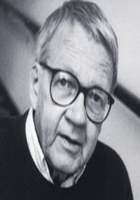Donald Justice
Donald Justice Poems
Our lives avoided tragedy
Simply by going on and on,
Without end and with little apparent meaning.
Oh, there were storms and small catastrophes.
...
1
Dear ghosts, dear presences, O my dear parents,
Why were you so sad on porches, whispering?
What great melancholies were loosed among our swings!
...
All these maneuverings to avoid
The touching of hands,
These shifts to keep the eyes employed
On objects more or less neutral
...
Now comes the evening of the mind.
Here are the fireflies twitching in the blood;
Here is the shadow moving down the page
Where you sit reading by the garden wall.
...
This poem is not addressed to you.
You may come into it briefly,
But no one will find you here, no one.
You will have changed before the poem will.
...
We shall not ever meet them bearded in heaven
Nor sunning themselves among the bald of hell;
If anywhere, in the deserted schoolyard at twilight,
forming a ring, perhaps, or joining hands
...
Thirty today, I saw
The trees flare briefly like
The candles on a cake,
As the sun went down the sky,
...
Thirty today, I saw
The trees flare briefly like
The candles upon a cake
As the sun went down the sky,
...
We have climbed the mountain.
There's nothing more to do.
It is terrible to come down
To the valley
...
It's snowing this afternoon and there are no flowers.
There is only this sound of falling, quiet and remote,
Like the memory of scales descending the white keys
Of a childhood piano- outside the window, palms!
...
Your face more than others' faces
Maps the half-remembered places
I have come to I while I slept—
Continents a dream had kept
...
Papier-mache body; blue-and-black cotton jersey cover. Metal stand. Instructions included.
-- Sears, Roebuck Catalogue
O my coy darling, still
...
Jane looks down at her organdy skirt
As if it somehow were the thing disgraced,
For being there, on the floor, in the dirt,
And she catches it up about her waist,
...
This one was put in a jacket,
This one was sent home,
This one was given bread and meat
But would eat none,
...
A delicate young Negro stands
With the reins of a horse clutched loosely in his hands;
So delicate, indeed, that we wonder if he can hold the spirited creature
beside him
...
It begins again, the nocturnal pulse.
It courses through the cables laid for it.
It mounts to the chandeliers and beats there, hotly.
We are too close. Too late, we would move back.
...
One of those men who can be a car salesman or a tourist from Syracuse or a hired assassin.
-- John D. MacDonald
You would not recognize me.
...
Donald Justice Biography
Donald Justice was an American poet and teacher of writing. Life and Career Justice grew up in Florida, and earned a bachelor's degree from the University of Miami in 1945. He received an M.A. from the University of North Carolina in 1947, studied for a time at Stanford University, and ultimately earned a doctorate from the University of Iowa in 1954. He went on to teach for many years at the Iowa Writers' Workshop, the nation's first graduate program in creative writing. He also taught at Syracuse University, the University of California at Irvine, Princeton University, the University of Virginia, and the University of Florida in Gainesville. Justice published thirteen collections of his poetry. The first collection, The Summer Anniversaries, was the winner of the Lamont Poetry Prize given by the Academy of American Poets in 1961; Selected Poems won the Pulitzer Prize for Poetry in 1980. He was awarded the Bollingen Prize in Poetry in 1991, and the Lannan Literary Award for Poetry in 1996. His honors also included grants from the Guggenheim Foundation, the Rockefeller Foundation, and the National Endowment for the Arts. He was a member of the American Academy of Arts and Letters, and a Chancellor of the Academy of American Poets from 1997 to 2003. His Collected Poems was nominated for the National Book Award in 2004. Justice was also a National Book Award Finalist in 1961, 1974, and 1995. Of Justice as teacher, his student and later colleague Marvin Bell said in a eulogy, “As a teacher, Don chose always to be on the side of the poem, defending it from half-baked attacks by students anxious to defend their own turf. While he had firm preferences in private, as a teacher Don defended all turfs. He had little use for poetic theory.” Of Justice's accomplishments as a poet, his former student, the poet and critic Tad Richards, noted that, "Donald Justice is likely to be remembered as a poet who gave his age a quiet but compelling insight into loss and distance, and who set a standard for craftsmanship, attention to detail, and subtleties of rhythm." Justice's work was the subject of the 1998 volume Certain Solitudes: On The Poetry of Donald Justice, which is a collection of essays edited by Dana Gioia and William Logan.)
The Best Poem Of Donald Justice
Men At Forty
Men at forty
Learn to close softly
The doors to rooms they will not be
Coming back to

CONGRATULATIONS being chosen by Poem Hunter and Editors as The Poet Of The Day. We as readers from PH are very happy to read this. Hoorray! We wish you an enjoyable Day!